The Impact of Ludification of Culture: A Research Essay
VerifiedAdded on 2023/01/19
|6
|2109
|37
Essay
AI Summary
This essay critically examines the ludification of culture, a phenomenon where game-like elements are increasingly integrated into non-game contexts, and its effects on everyday life practices. The paper explores how gamification, a key aspect of ludification, is observed across various sectors, including education, organizations, and public spaces, significantly influencing human behavior. It differentiates between gamification and the broader concept of ludification, highlighting the increasing importance of digital games and playful applications in contemporary culture. The essay discusses the complexities and ambivalent nature of play, the manipulative aspects of gamification, and its role in the context of digital media and post-fordist capitalism. It concludes by emphasizing the significant role of gamification in modern society and anticipates further innovative changes that will continuously engage people.

Ludification Of Culture
Due Date: 18 /04/2019
Word Count:1531
Due Date: 18 /04/2019
Word Count:1531
Paraphrase This Document
Need a fresh take? Get an instant paraphrase of this document with our AI Paraphraser
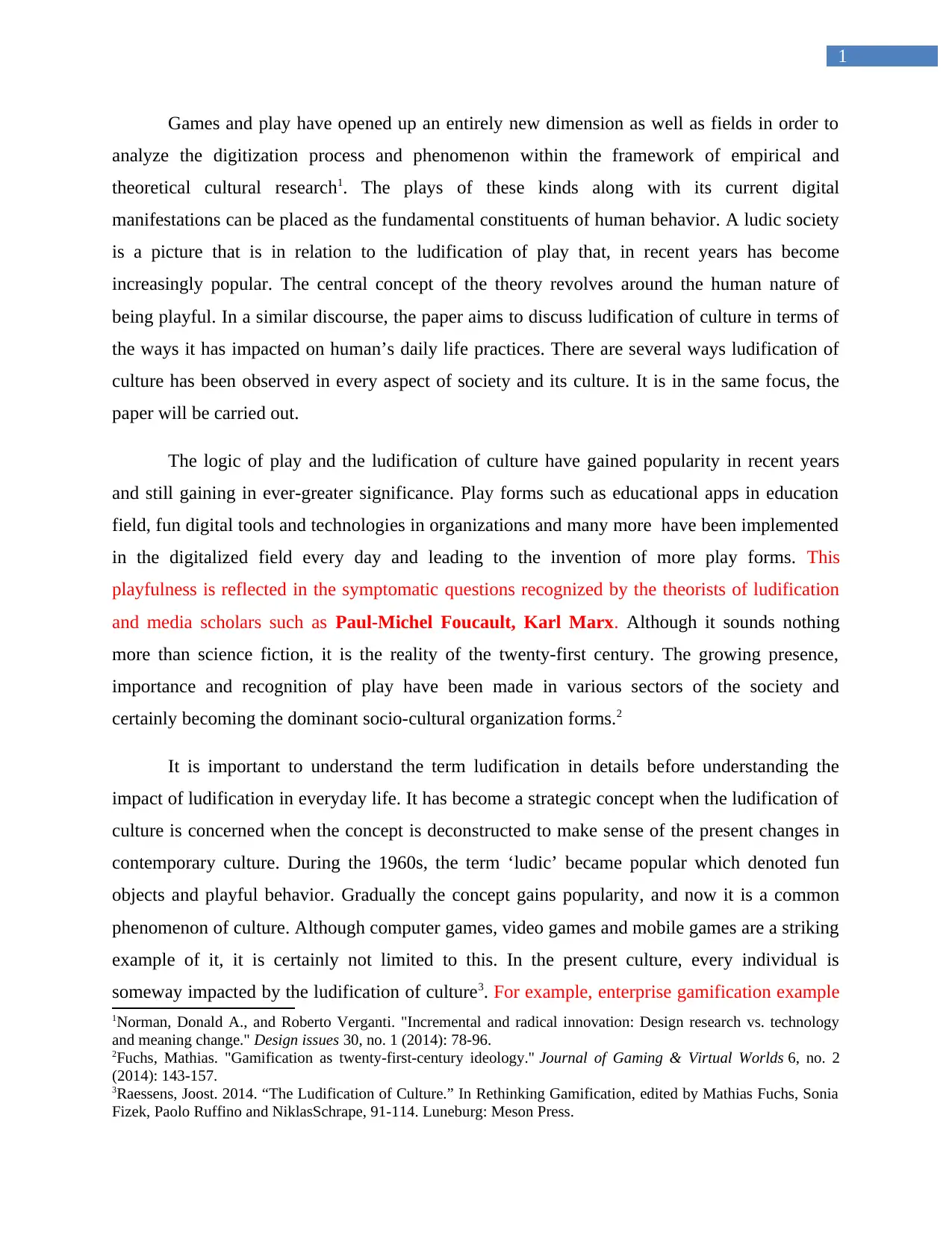
1
Games and play have opened up an entirely new dimension as well as fields in order to
analyze the digitization process and phenomenon within the framework of empirical and
theoretical cultural research1. The plays of these kinds along with its current digital
manifestations can be placed as the fundamental constituents of human behavior. A ludic society
is a picture that is in relation to the ludification of play that, in recent years has become
increasingly popular. The central concept of the theory revolves around the human nature of
being playful. In a similar discourse, the paper aims to discuss ludification of culture in terms of
the ways it has impacted on human’s daily life practices. There are several ways ludification of
culture has been observed in every aspect of society and its culture. It is in the same focus, the
paper will be carried out.
The logic of play and the ludification of culture have gained popularity in recent years
and still gaining in ever-greater significance. Play forms such as educational apps in education
field, fun digital tools and technologies in organizations and many more have been implemented
in the digitalized field every day and leading to the invention of more play forms. This
playfulness is reflected in the symptomatic questions recognized by the theorists of ludification
and media scholars such as Paul-Michel Foucault, Karl Marx. Although it sounds nothing
more than science fiction, it is the reality of the twenty-first century. The growing presence,
importance and recognition of play have been made in various sectors of the society and
certainly becoming the dominant socio-cultural organization forms.2
It is important to understand the term ludification in details before understanding the
impact of ludification in everyday life. It has become a strategic concept when the ludification of
culture is concerned when the concept is deconstructed to make sense of the present changes in
contemporary culture. During the 1960s, the term ‘ludic’ became popular which denoted fun
objects and playful behavior. Gradually the concept gains popularity, and now it is a common
phenomenon of culture. Although computer games, video games and mobile games are a striking
example of it, it is certainly not limited to this. In the present culture, every individual is
someway impacted by the ludification of culture3. For example, enterprise gamification example
1Norman, Donald A., and Roberto Verganti. "Incremental and radical innovation: Design research vs. technology
and meaning change." Design issues 30, no. 1 (2014): 78-96.
2Fuchs, Mathias. "Gamification as twenty-first-century ideology." Journal of Gaming & Virtual Worlds 6, no. 2
(2014): 143-157.
3Raessens, Joost. 2014. “The Ludification of Culture.” In Rethinking Gamification, edited by Mathias Fuchs, Sonia
Fizek, Paolo Ruffino and NiklasSchrape, 91-114. Luneburg: Meson Press.
Games and play have opened up an entirely new dimension as well as fields in order to
analyze the digitization process and phenomenon within the framework of empirical and
theoretical cultural research1. The plays of these kinds along with its current digital
manifestations can be placed as the fundamental constituents of human behavior. A ludic society
is a picture that is in relation to the ludification of play that, in recent years has become
increasingly popular. The central concept of the theory revolves around the human nature of
being playful. In a similar discourse, the paper aims to discuss ludification of culture in terms of
the ways it has impacted on human’s daily life practices. There are several ways ludification of
culture has been observed in every aspect of society and its culture. It is in the same focus, the
paper will be carried out.
The logic of play and the ludification of culture have gained popularity in recent years
and still gaining in ever-greater significance. Play forms such as educational apps in education
field, fun digital tools and technologies in organizations and many more have been implemented
in the digitalized field every day and leading to the invention of more play forms. This
playfulness is reflected in the symptomatic questions recognized by the theorists of ludification
and media scholars such as Paul-Michel Foucault, Karl Marx. Although it sounds nothing
more than science fiction, it is the reality of the twenty-first century. The growing presence,
importance and recognition of play have been made in various sectors of the society and
certainly becoming the dominant socio-cultural organization forms.2
It is important to understand the term ludification in details before understanding the
impact of ludification in everyday life. It has become a strategic concept when the ludification of
culture is concerned when the concept is deconstructed to make sense of the present changes in
contemporary culture. During the 1960s, the term ‘ludic’ became popular which denoted fun
objects and playful behavior. Gradually the concept gains popularity, and now it is a common
phenomenon of culture. Although computer games, video games and mobile games are a striking
example of it, it is certainly not limited to this. In the present culture, every individual is
someway impacted by the ludification of culture3. For example, enterprise gamification example
1Norman, Donald A., and Roberto Verganti. "Incremental and radical innovation: Design research vs. technology
and meaning change." Design issues 30, no. 1 (2014): 78-96.
2Fuchs, Mathias. "Gamification as twenty-first-century ideology." Journal of Gaming & Virtual Worlds 6, no. 2
(2014): 143-157.
3Raessens, Joost. 2014. “The Ludification of Culture.” In Rethinking Gamification, edited by Mathias Fuchs, Sonia
Fizek, Paolo Ruffino and NiklasSchrape, 91-114. Luneburg: Meson Press.
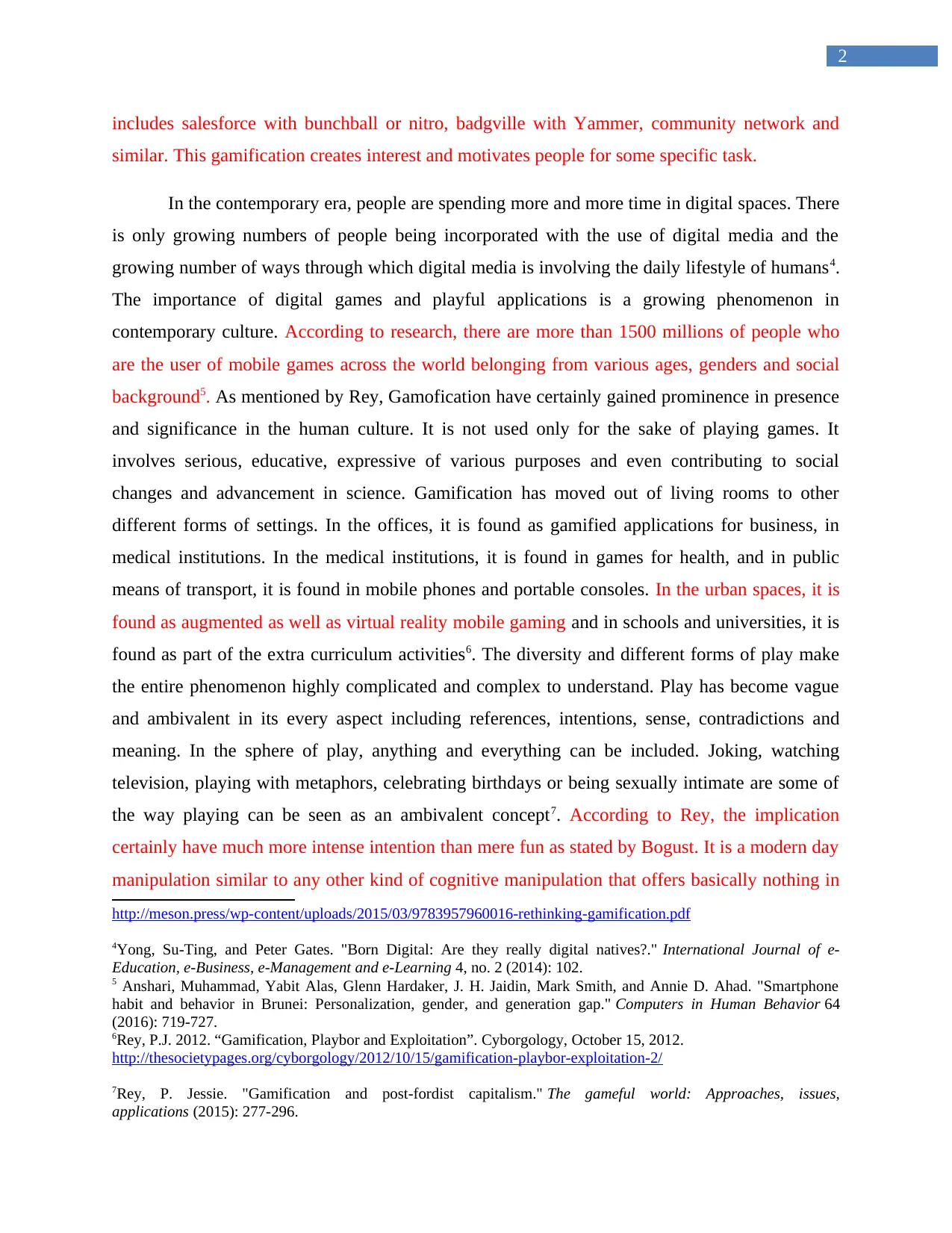
2
includes salesforce with bunchball or nitro, badgville with Yammer, community network and
similar. This gamification creates interest and motivates people for some specific task.
In the contemporary era, people are spending more and more time in digital spaces. There
is only growing numbers of people being incorporated with the use of digital media and the
growing number of ways through which digital media is involving the daily lifestyle of humans4.
The importance of digital games and playful applications is a growing phenomenon in
contemporary culture. According to research, there are more than 1500 millions of people who
are the user of mobile games across the world belonging from various ages, genders and social
background5. As mentioned by Rey, Gamofication have certainly gained prominence in presence
and significance in the human culture. It is not used only for the sake of playing games. It
involves serious, educative, expressive of various purposes and even contributing to social
changes and advancement in science. Gamification has moved out of living rooms to other
different forms of settings. In the offices, it is found as gamified applications for business, in
medical institutions. In the medical institutions, it is found in games for health, and in public
means of transport, it is found in mobile phones and portable consoles. In the urban spaces, it is
found as augmented as well as virtual reality mobile gaming and in schools and universities, it is
found as part of the extra curriculum activities6. The diversity and different forms of play make
the entire phenomenon highly complicated and complex to understand. Play has become vague
and ambivalent in its every aspect including references, intentions, sense, contradictions and
meaning. In the sphere of play, anything and everything can be included. Joking, watching
television, playing with metaphors, celebrating birthdays or being sexually intimate are some of
the way playing can be seen as an ambivalent concept7. According to Rey, the implication
certainly have much more intense intention than mere fun as stated by Bogust. It is a modern day
manipulation similar to any other kind of cognitive manipulation that offers basically nothing in
http://meson.press/wp-content/uploads/2015/03/9783957960016-rethinking-gamification.pdf
4Yong, Su-Ting, and Peter Gates. "Born Digital: Are they really digital natives?." International Journal of e-
Education, e-Business, e-Management and e-Learning 4, no. 2 (2014): 102.
5 Anshari, Muhammad, Yabit Alas, Glenn Hardaker, J. H. Jaidin, Mark Smith, and Annie D. Ahad. "Smartphone
habit and behavior in Brunei: Personalization, gender, and generation gap." Computers in Human Behavior 64
(2016): 719-727.
6Rey, P.J. 2012. “Gamification, Playbor and Exploitation”. Cyborgology, October 15, 2012.
http://thesocietypages.org/cyborgology/2012/10/15/gamification-playbor-exploitation-2/
7Rey, P. Jessie. "Gamification and post-fordist capitalism." The gameful world: Approaches, issues,
applications (2015): 277-296.
includes salesforce with bunchball or nitro, badgville with Yammer, community network and
similar. This gamification creates interest and motivates people for some specific task.
In the contemporary era, people are spending more and more time in digital spaces. There
is only growing numbers of people being incorporated with the use of digital media and the
growing number of ways through which digital media is involving the daily lifestyle of humans4.
The importance of digital games and playful applications is a growing phenomenon in
contemporary culture. According to research, there are more than 1500 millions of people who
are the user of mobile games across the world belonging from various ages, genders and social
background5. As mentioned by Rey, Gamofication have certainly gained prominence in presence
and significance in the human culture. It is not used only for the sake of playing games. It
involves serious, educative, expressive of various purposes and even contributing to social
changes and advancement in science. Gamification has moved out of living rooms to other
different forms of settings. In the offices, it is found as gamified applications for business, in
medical institutions. In the medical institutions, it is found in games for health, and in public
means of transport, it is found in mobile phones and portable consoles. In the urban spaces, it is
found as augmented as well as virtual reality mobile gaming and in schools and universities, it is
found as part of the extra curriculum activities6. The diversity and different forms of play make
the entire phenomenon highly complicated and complex to understand. Play has become vague
and ambivalent in its every aspect including references, intentions, sense, contradictions and
meaning. In the sphere of play, anything and everything can be included. Joking, watching
television, playing with metaphors, celebrating birthdays or being sexually intimate are some of
the way playing can be seen as an ambivalent concept7. According to Rey, the implication
certainly have much more intense intention than mere fun as stated by Bogust. It is a modern day
manipulation similar to any other kind of cognitive manipulation that offers basically nothing in
http://meson.press/wp-content/uploads/2015/03/9783957960016-rethinking-gamification.pdf
4Yong, Su-Ting, and Peter Gates. "Born Digital: Are they really digital natives?." International Journal of e-
Education, e-Business, e-Management and e-Learning 4, no. 2 (2014): 102.
5 Anshari, Muhammad, Yabit Alas, Glenn Hardaker, J. H. Jaidin, Mark Smith, and Annie D. Ahad. "Smartphone
habit and behavior in Brunei: Personalization, gender, and generation gap." Computers in Human Behavior 64
(2016): 719-727.
6Rey, P.J. 2012. “Gamification, Playbor and Exploitation”. Cyborgology, October 15, 2012.
http://thesocietypages.org/cyborgology/2012/10/15/gamification-playbor-exploitation-2/
7Rey, P. Jessie. "Gamification and post-fordist capitalism." The gameful world: Approaches, issues,
applications (2015): 277-296.
⊘ This is a preview!⊘
Do you want full access?
Subscribe today to unlock all pages.

Trusted by 1+ million students worldwide
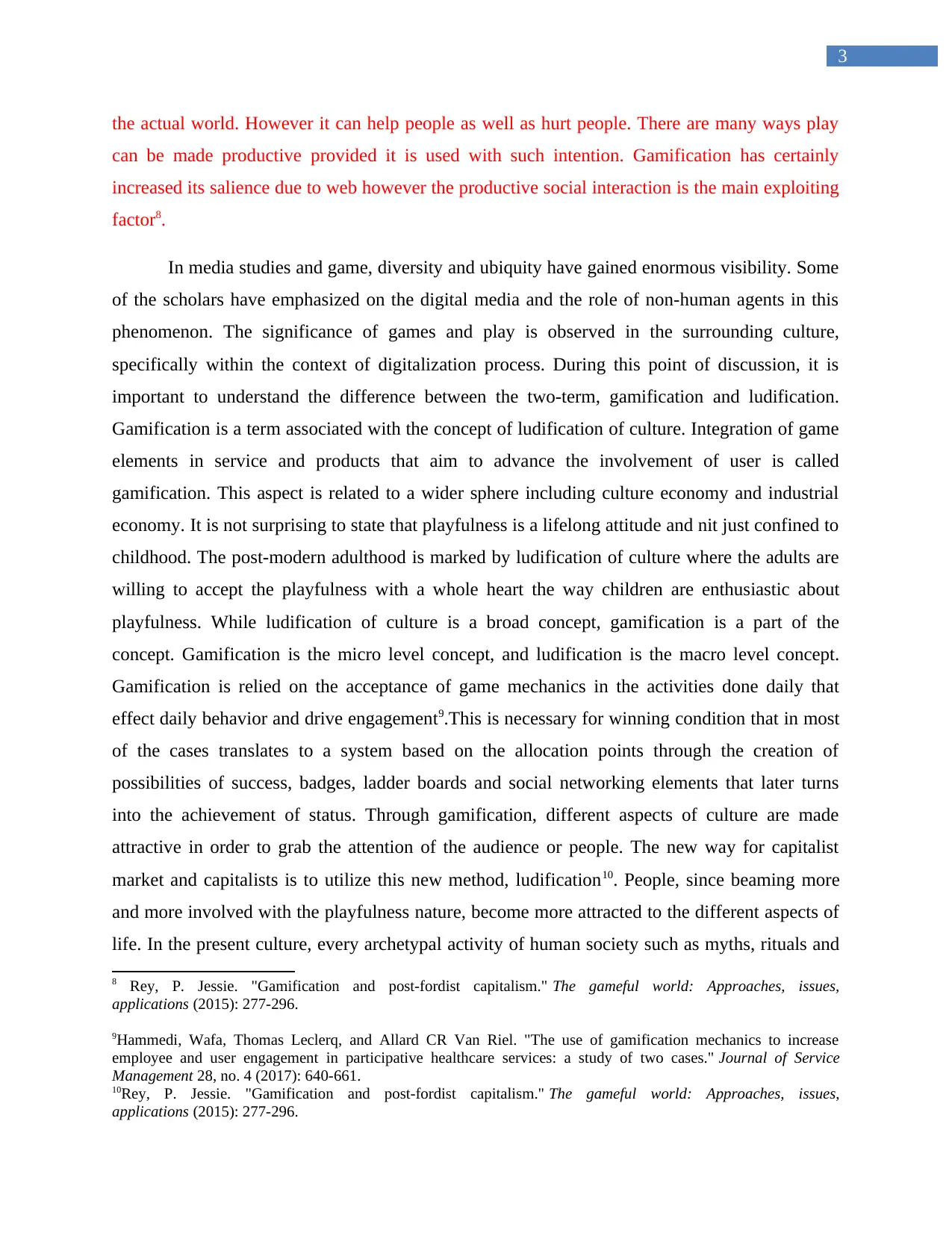
3
the actual world. However it can help people as well as hurt people. There are many ways play
can be made productive provided it is used with such intention. Gamification has certainly
increased its salience due to web however the productive social interaction is the main exploiting
factor8.
In media studies and game, diversity and ubiquity have gained enormous visibility. Some
of the scholars have emphasized on the digital media and the role of non-human agents in this
phenomenon. The significance of games and play is observed in the surrounding culture,
specifically within the context of digitalization process. During this point of discussion, it is
important to understand the difference between the two-term, gamification and ludification.
Gamification is a term associated with the concept of ludification of culture. Integration of game
elements in service and products that aim to advance the involvement of user is called
gamification. This aspect is related to a wider sphere including culture economy and industrial
economy. It is not surprising to state that playfulness is a lifelong attitude and nit just confined to
childhood. The post-modern adulthood is marked by ludification of culture where the adults are
willing to accept the playfulness with a whole heart the way children are enthusiastic about
playfulness. While ludification of culture is a broad concept, gamification is a part of the
concept. Gamification is the micro level concept, and ludification is the macro level concept.
Gamification is relied on the acceptance of game mechanics in the activities done daily that
effect daily behavior and drive engagement9.This is necessary for winning condition that in most
of the cases translates to a system based on the allocation points through the creation of
possibilities of success, badges, ladder boards and social networking elements that later turns
into the achievement of status. Through gamification, different aspects of culture are made
attractive in order to grab the attention of the audience or people. The new way for capitalist
market and capitalists is to utilize this new method, ludification10. People, since beaming more
and more involved with the playfulness nature, become more attracted to the different aspects of
life. In the present culture, every archetypal activity of human society such as myths, rituals and
8 Rey, P. Jessie. "Gamification and post-fordist capitalism." The gameful world: Approaches, issues,
applications (2015): 277-296.
9Hammedi, Wafa, Thomas Leclerq, and Allard CR Van Riel. "The use of gamification mechanics to increase
employee and user engagement in participative healthcare services: a study of two cases." Journal of Service
Management 28, no. 4 (2017): 640-661.
10Rey, P. Jessie. "Gamification and post-fordist capitalism." The gameful world: Approaches, issues,
applications (2015): 277-296.
the actual world. However it can help people as well as hurt people. There are many ways play
can be made productive provided it is used with such intention. Gamification has certainly
increased its salience due to web however the productive social interaction is the main exploiting
factor8.
In media studies and game, diversity and ubiquity have gained enormous visibility. Some
of the scholars have emphasized on the digital media and the role of non-human agents in this
phenomenon. The significance of games and play is observed in the surrounding culture,
specifically within the context of digitalization process. During this point of discussion, it is
important to understand the difference between the two-term, gamification and ludification.
Gamification is a term associated with the concept of ludification of culture. Integration of game
elements in service and products that aim to advance the involvement of user is called
gamification. This aspect is related to a wider sphere including culture economy and industrial
economy. It is not surprising to state that playfulness is a lifelong attitude and nit just confined to
childhood. The post-modern adulthood is marked by ludification of culture where the adults are
willing to accept the playfulness with a whole heart the way children are enthusiastic about
playfulness. While ludification of culture is a broad concept, gamification is a part of the
concept. Gamification is the micro level concept, and ludification is the macro level concept.
Gamification is relied on the acceptance of game mechanics in the activities done daily that
effect daily behavior and drive engagement9.This is necessary for winning condition that in most
of the cases translates to a system based on the allocation points through the creation of
possibilities of success, badges, ladder boards and social networking elements that later turns
into the achievement of status. Through gamification, different aspects of culture are made
attractive in order to grab the attention of the audience or people. The new way for capitalist
market and capitalists is to utilize this new method, ludification10. People, since beaming more
and more involved with the playfulness nature, become more attracted to the different aspects of
life. In the present culture, every archetypal activity of human society such as myths, rituals and
8 Rey, P. Jessie. "Gamification and post-fordist capitalism." The gameful world: Approaches, issues,
applications (2015): 277-296.
9Hammedi, Wafa, Thomas Leclerq, and Allard CR Van Riel. "The use of gamification mechanics to increase
employee and user engagement in participative healthcare services: a study of two cases." Journal of Service
Management 28, no. 4 (2017): 640-661.
10Rey, P. Jessie. "Gamification and post-fordist capitalism." The gameful world: Approaches, issues,
applications (2015): 277-296.
Paraphrase This Document
Need a fresh take? Get an instant paraphrase of this document with our AI Paraphraser
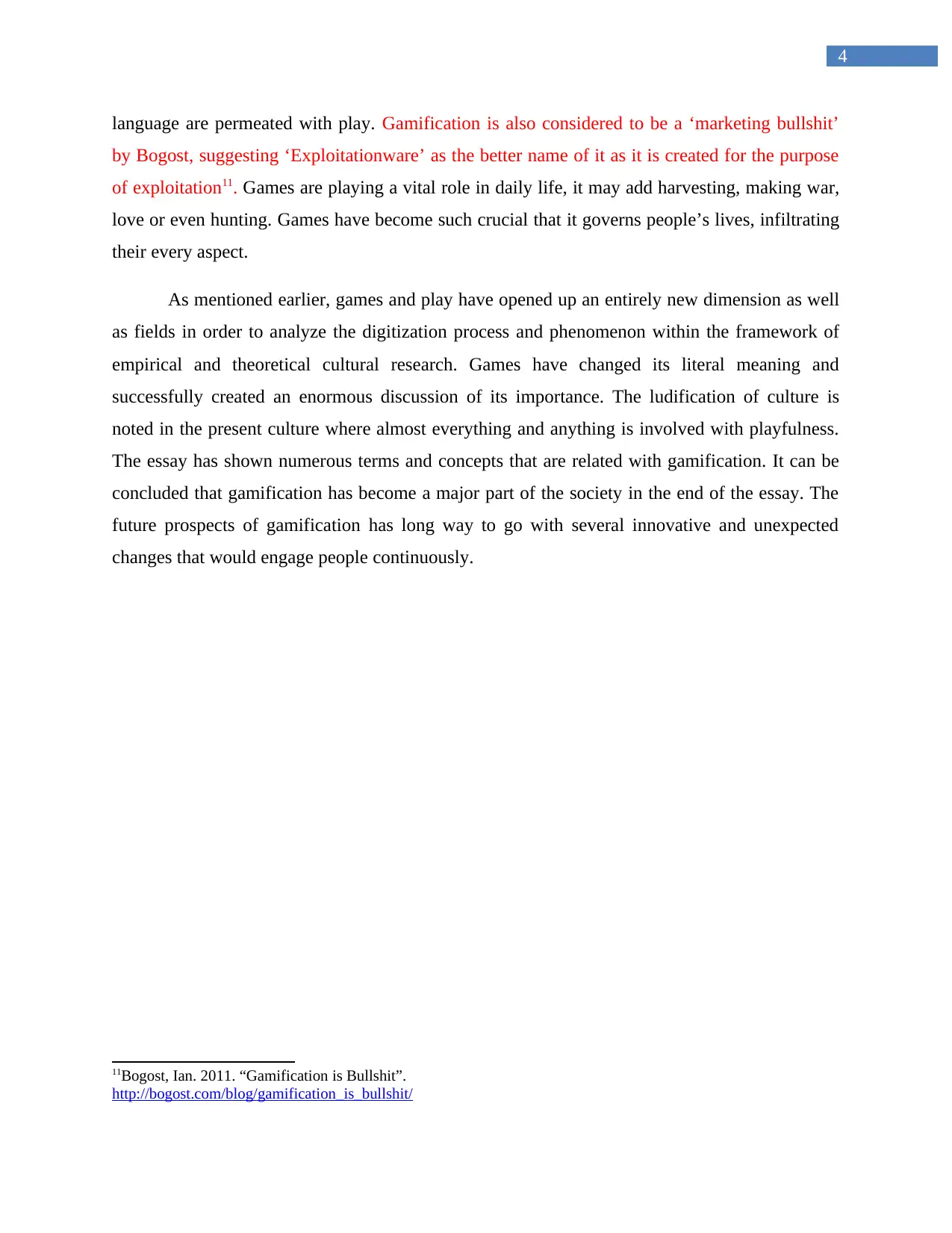
4
language are permeated with play. Gamification is also considered to be a ‘marketing bullshit’
by Bogost, suggesting ‘Exploitationware’ as the better name of it as it is created for the purpose
of exploitation11. Games are playing a vital role in daily life, it may add harvesting, making war,
love or even hunting. Games have become such crucial that it governs people’s lives, infiltrating
their every aspect.
As mentioned earlier, games and play have opened up an entirely new dimension as well
as fields in order to analyze the digitization process and phenomenon within the framework of
empirical and theoretical cultural research. Games have changed its literal meaning and
successfully created an enormous discussion of its importance. The ludification of culture is
noted in the present culture where almost everything and anything is involved with playfulness.
The essay has shown numerous terms and concepts that are related with gamification. It can be
concluded that gamification has become a major part of the society in the end of the essay. The
future prospects of gamification has long way to go with several innovative and unexpected
changes that would engage people continuously.
11Bogost, Ian. 2011. “Gamification is Bullshit”.
http://bogost.com/blog/gamification_is_bullshit/
language are permeated with play. Gamification is also considered to be a ‘marketing bullshit’
by Bogost, suggesting ‘Exploitationware’ as the better name of it as it is created for the purpose
of exploitation11. Games are playing a vital role in daily life, it may add harvesting, making war,
love or even hunting. Games have become such crucial that it governs people’s lives, infiltrating
their every aspect.
As mentioned earlier, games and play have opened up an entirely new dimension as well
as fields in order to analyze the digitization process and phenomenon within the framework of
empirical and theoretical cultural research. Games have changed its literal meaning and
successfully created an enormous discussion of its importance. The ludification of culture is
noted in the present culture where almost everything and anything is involved with playfulness.
The essay has shown numerous terms and concepts that are related with gamification. It can be
concluded that gamification has become a major part of the society in the end of the essay. The
future prospects of gamification has long way to go with several innovative and unexpected
changes that would engage people continuously.
11Bogost, Ian. 2011. “Gamification is Bullshit”.
http://bogost.com/blog/gamification_is_bullshit/
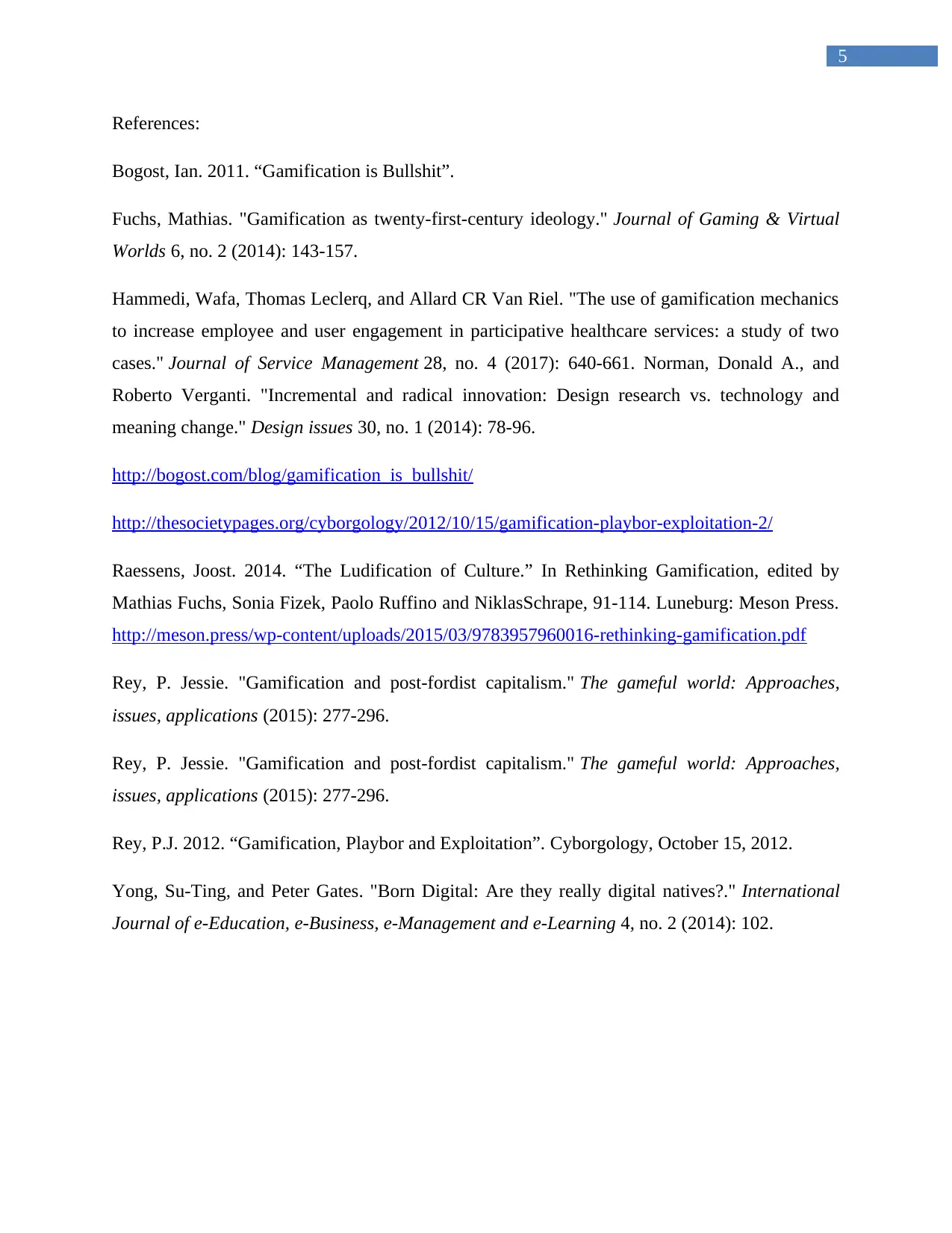
5
References:
Bogost, Ian. 2011. “Gamification is Bullshit”.
Fuchs, Mathias. "Gamification as twenty-first-century ideology." Journal of Gaming & Virtual
Worlds 6, no. 2 (2014): 143-157.
Hammedi, Wafa, Thomas Leclerq, and Allard CR Van Riel. "The use of gamification mechanics
to increase employee and user engagement in participative healthcare services: a study of two
cases." Journal of Service Management 28, no. 4 (2017): 640-661. Norman, Donald A., and
Roberto Verganti. "Incremental and radical innovation: Design research vs. technology and
meaning change." Design issues 30, no. 1 (2014): 78-96.
http://bogost.com/blog/gamification_is_bullshit/
http://thesocietypages.org/cyborgology/2012/10/15/gamification-playbor-exploitation-2/
Raessens, Joost. 2014. “The Ludification of Culture.” In Rethinking Gamification, edited by
Mathias Fuchs, Sonia Fizek, Paolo Ruffino and NiklasSchrape, 91-114. Luneburg: Meson Press.
http://meson.press/wp-content/uploads/2015/03/9783957960016-rethinking-gamification.pdf
Rey, P. Jessie. "Gamification and post-fordist capitalism." The gameful world: Approaches,
issues, applications (2015): 277-296.
Rey, P. Jessie. "Gamification and post-fordist capitalism." The gameful world: Approaches,
issues, applications (2015): 277-296.
Rey, P.J. 2012. “Gamification, Playbor and Exploitation”. Cyborgology, October 15, 2012.
Yong, Su-Ting, and Peter Gates. "Born Digital: Are they really digital natives?." International
Journal of e-Education, e-Business, e-Management and e-Learning 4, no. 2 (2014): 102.
References:
Bogost, Ian. 2011. “Gamification is Bullshit”.
Fuchs, Mathias. "Gamification as twenty-first-century ideology." Journal of Gaming & Virtual
Worlds 6, no. 2 (2014): 143-157.
Hammedi, Wafa, Thomas Leclerq, and Allard CR Van Riel. "The use of gamification mechanics
to increase employee and user engagement in participative healthcare services: a study of two
cases." Journal of Service Management 28, no. 4 (2017): 640-661. Norman, Donald A., and
Roberto Verganti. "Incremental and radical innovation: Design research vs. technology and
meaning change." Design issues 30, no. 1 (2014): 78-96.
http://bogost.com/blog/gamification_is_bullshit/
http://thesocietypages.org/cyborgology/2012/10/15/gamification-playbor-exploitation-2/
Raessens, Joost. 2014. “The Ludification of Culture.” In Rethinking Gamification, edited by
Mathias Fuchs, Sonia Fizek, Paolo Ruffino and NiklasSchrape, 91-114. Luneburg: Meson Press.
http://meson.press/wp-content/uploads/2015/03/9783957960016-rethinking-gamification.pdf
Rey, P. Jessie. "Gamification and post-fordist capitalism." The gameful world: Approaches,
issues, applications (2015): 277-296.
Rey, P. Jessie. "Gamification and post-fordist capitalism." The gameful world: Approaches,
issues, applications (2015): 277-296.
Rey, P.J. 2012. “Gamification, Playbor and Exploitation”. Cyborgology, October 15, 2012.
Yong, Su-Ting, and Peter Gates. "Born Digital: Are they really digital natives?." International
Journal of e-Education, e-Business, e-Management and e-Learning 4, no. 2 (2014): 102.
⊘ This is a preview!⊘
Do you want full access?
Subscribe today to unlock all pages.

Trusted by 1+ million students worldwide
1 out of 6
Your All-in-One AI-Powered Toolkit for Academic Success.
+13062052269
info@desklib.com
Available 24*7 on WhatsApp / Email
![[object Object]](/_next/static/media/star-bottom.7253800d.svg)
Unlock your academic potential
Copyright © 2020–2026 A2Z Services. All Rights Reserved. Developed and managed by ZUCOL.
